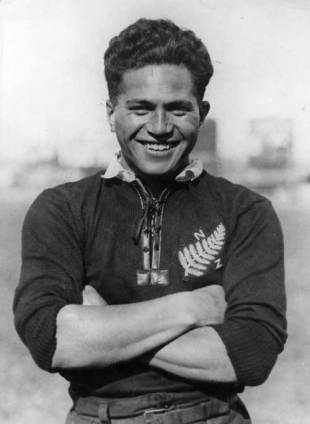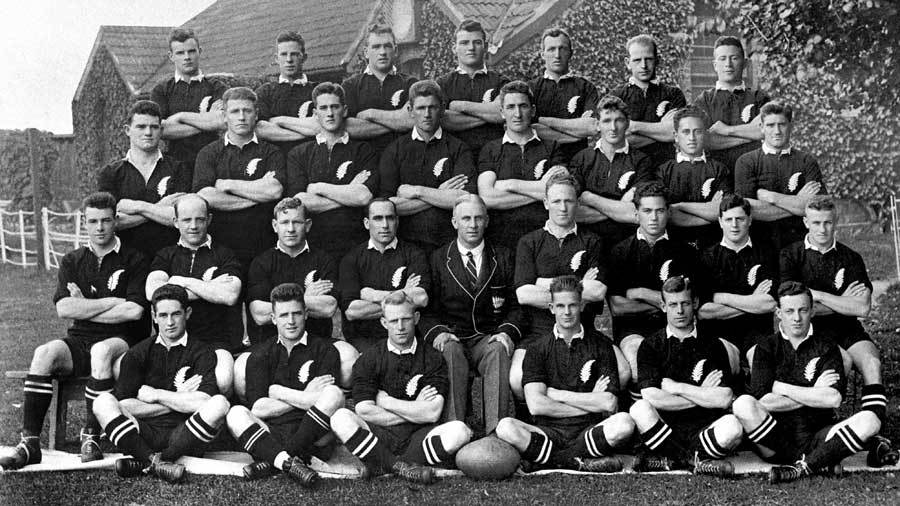|
England 11-17 New Zealand
Brownlie sees red and makes history
Richard Seeckts
January 3, 1925

George Nepia - a key cog in the 'Invincibles'
© Getty Images Enlarge
New Zealand beat England in a Twickenham classic best remembered for the first sending off in international rugby, that of All Black forward Cyril Brownlie. The match was the climax of a four month, 28 game tour of Britain and Ireland; the final hurdle to achieve a 100% winning record and the 'Invincibles' tag the tourists still hold. England, Grand Slam winners in three of the previous four seasons, provided the stiffest test of the tour, despite fielding a much changed set of backs and missing winger Carston Catcheside who, in 1924, had become the first man to score a try in all four rounds of the Five Nations Championship. So eagerly anticipated was the match that the Rugby Union received reports of "members of a few clubs transferring tickets for admission for a profit". A record crowd of 60,000 turned up on the day, with Southern Railway shaming its 21st century successors by putting on ten 'Twickenham special' trains from Waterloo before the match and 14 return trains afterwards, in addition to the scheduled services. Wavell Wakefield, England's captain was not averse to a bit of 'rough housing' and, aware that New Zealand were also physically intimidating, encouraged his men to assert themselves from the start. The opening minutes saw furious exchanges, England's Reg Edwards and Wakefield in particular keen to get their revenge in first. The Times obliquely referred to "more than one unpleasant proof that the forwards were taking things too seriously", though England full-back Jim Brough described Edwards as "a bit free with his fists" and there was liberal misuse of boots. Referee Albert Freethy repeatedly warned both sides, so when Brownlie stamped on a prone England player in the eighth minute, Freethy kept his word and sent him off. The referee later explained: "In some loose play the ball had been sent away and two or three England forwards were lying on the ground. Brownlie was a few feet away from them, and as he came back he deliberately kicked on the leg an England forward lying face downward on the ground. I had taken my eye off the ball for a moment, and therefore saw exactly what happened. Previous to this I had warned each side generally three times, and therefore I had no option but to send Brownlie off the field. I much regretted having to do this, but in the circumstances I had no alternative but to take this drastic action." All Black captain Jock Richardson protested, to no avail, and Twickenham fell silent as the significance of the moment sank in and Brownlie made his lonely walk off.

The 1924-25 New Zealand team © PA Photos
Enlarge
Initially, England made the extra man count but forward domination was frittered by clumsy back-play, attributed to lack of preparation time together. England took the lead with a Ron Cove-Smith try on 17 minutes, which Brough failed to convert. Slick All Black passing in the closing minutes of the first half produced unconverted tries for Snowy Svenson and John Steel, with Mark Nicholls adding a penalty for a 9-3 half-time lead. New Zealand used the experience of 27 tour matches together to overcome the flagging Englishmen in the third quarter, stretching the lead to 17-3 with tries by Maurice Brownlie and James Parker. England came back with a drop-kicked penalty from Len Corbett and a try created by Richard Hamilton-Wickes breaking out of defence, shaking off tacklers and offloading to Harold Kittermaster on halfway, who raced away to score under the posts. The try was converted but the lack of a reliable place kicker and scrappy play among the backs cost England dear. Even a man down, the physical fitness and superior teamwork of the tourists was too much for England. Ronnie Hillard, Oxford University prop making his debut for England, was appalled by the violence of the game. "If that is international rugby, I want nothing of it" he announced, and so ended his career in a day. The All Blacks' unbeaten run continued as they went home via France and Canada for an overall tour record of 32 wins from 32 matches. 19-year-old full-back George Nepia played in every match. So scarce was international rugby in the 1920s, however, that New Zealand did not play an international match at home between September 1921 and June 1930. This meant many of the Invincibles never wore the black shirt in New Zealand. Brownlie's tour continued - he played in France on the following two weekends - and he toured South Africa in 1928 under his younger brother Maurice, without winning another cap. Reg Edwards, widely considered lucky to complete the Twickenham match, never played for England again. Not until 1967 was another international player, New Zealand's Colin Meads at Murrayfield, sent-off. © ESPN Sports Media Ltd
| |||||||||||||||
Live Sports
Communication error please reload the page.
-
Football
-
Cricket
-
Rugby
-
- Days
- Hrs
- Mins
- Secs
F1 - Abu Dhabi GP
Abu Dhabi Grand Prix December 11-131. Max Verstappen ()
2. Valtteri Bottas (Mercedes)
3. Lewis Hamilton (Mercedes)
4. Alexander Albon ()
5. Lando Norris ()
6. Carlos Sainz Jr ()
-
ESPNOtherLive >>
Snooker - China Open
Tennis - Miami Open

